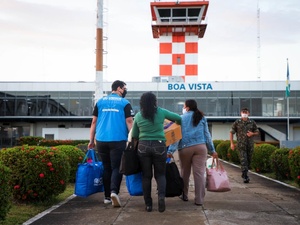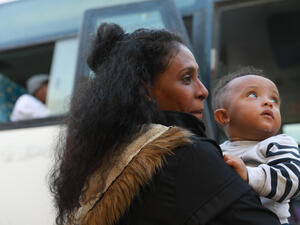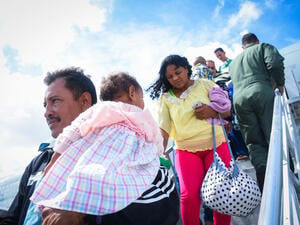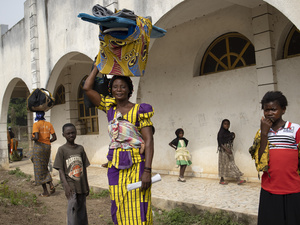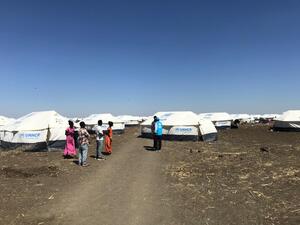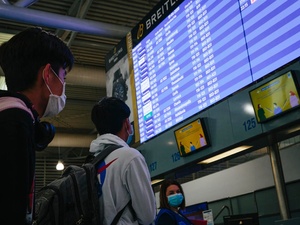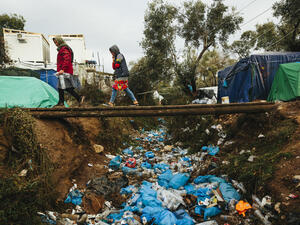UNHCR closes Burundi border centre; moves Congolese refugees inland
UNHCR closes Burundi border centre; moves Congolese refugees inland
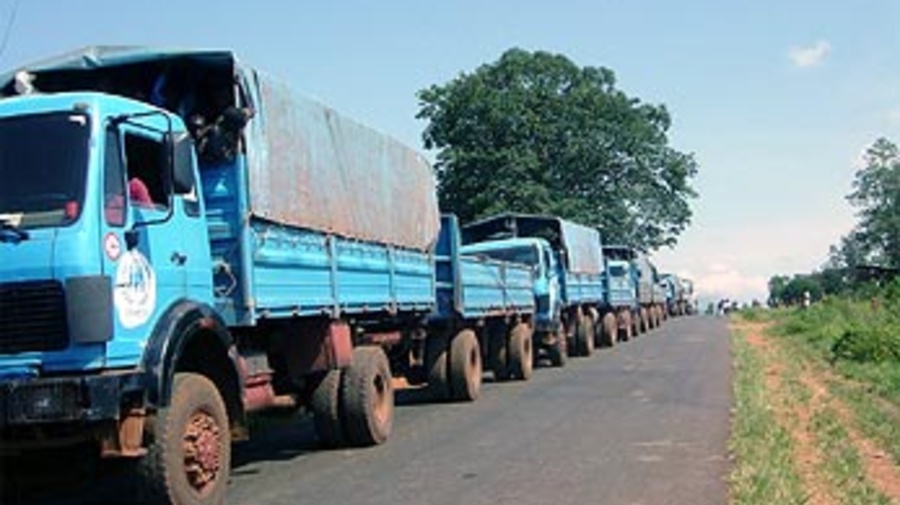
Convoys making the last transfer from Cishemeye transit centre to Gasorwe camp in Burundi.
GASORWE CAMP, Burundi, May 13 (UNHCR) - The last convoy of 724 Congolese refugees arrived Wednesday at Gasorwe camp in north-eastern Burundi, completing a four-month operation to move refugees to a camp at a safer distance from the border with the Democratic Republic of the Congo (DRC).
The refugees began fleeing to Burundi in late 2002, following an outbreak of fighting in the south Kivu region of the DRC. The UN refugee agency set up the Cishemeye transit centre in Burundi's north-western province of Cibitoke in January 2003 to provide an emergency shelter for the refugees.
"The transit centre was created on an emergency basis," explained Michele Cavinato, UNHCR's protection officer in Burundi. "It provided a safe haven for people fleeing the troubles in south Kivu, but it was too close to the border, and therefore was necessarily only temporary."
In addition, the transit centre's location in a still-volatile part of Burundi made assisting the refugees there very difficult. Missions to the centre had to be accompanied by armed guards and UN security assessments would not allow systematic assistance to be provided in the area.
UNHCR has a field office in Muyinga province, where Gasorwe camp is located. Moving to the camp means the refugees can stay in a safer environment and can receive assistance on a more regular basis.
UNHCR began transferring refugees from Cishemeye to Gasorwe in early February this year. In all, eight convoys carried 4,465 refugees to their new accommodation. They joined nearly 4,000 other Congolese refugees already living in the camp, many of whom fled conflict in the DRC in 1998-1999 and were relocated to the camp in 2002.
Refugees made the eight-hour trip in trucks. Pregnant women and vulnerable refugees, including elderly and sick people, were taken by minibus. The convoys made four rest stops en route to let the refugees stretch their legs and have a break from the travel.
Before the convoys departed, refugees received bread for the trip and the first night in the camp. High protein biscuits were also distributed on their arrival at Gasorwe. Because the trip took all day and the convoys arrived so late at the camp, distribution of other assistance had to wait until the next day. The refugees received household items like blankets, pots and pans, and jerry cans for water. Food rations were also distributed to the families.
Meanwhile, in Cishemeye, the transit centre is now closed and the site has been stripped bare.
At first, some of the refugees were reluctant to move to the camp, primarily because they hoped that the situation in the DRC would improve enough to let them return home quickly. Some of the refugees also had livestock near the border and did not want to move away from them. There was also some concern about what life would be like in the camp. UNHCR staff had many meetings with the refugees, and early this year, the agency arranged for some of the refugees to visit Gasorwe camp to see the conditions there first hand.
"There are much better conditions in the camp," said Cavinato. "Every family has their own little hut, while in Cishemeye, people were staying in big communal halls with no privacy. In the camp, we also try to provide schools and assistance as best we can, while in Cibitoke province, this would be pretty difficult."
In the end, while some refugees did opt to remain in Cibitoke province, thousands eventually signed up to move to the camp.
"This is a great success for us," said Cavinato. "When they were leaving Cishemeye, they were very happy to leave."
Gasorwe camp now hosts 8,168 Congolese refugees. In all, there are an estimated 40,500 Congolese refugees in Burundi, according to the Burundi authorities.


